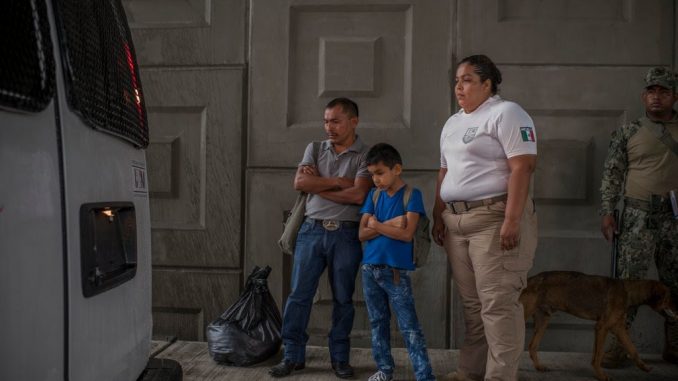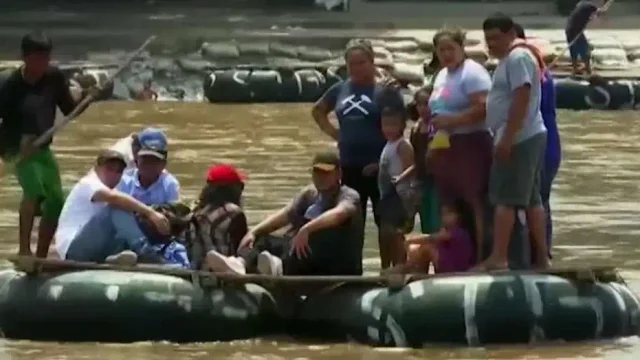

TAPACHULA, Mexico — Unprecedented and inconvenient, the influx of thousands of National Guard into southern Mexicois nevertheless being welcomed by many residents near the Guatemala border.
“We agree with the National Guard coming because we are invaded with people,” said Arcla Martinez, who sells chicken in a market in Tapachula. “We do not want them coming in.”
A few stalls down, Juan Antonio Rivera toils over a 50-year-old black Singer sewing machine repairing handbags and backpacks.
(snip)
“Tapachula is a nice place, a nice city, but too much people they use drugs, drinking,” added vegetable salesman Alejandro Gonzales. “It is crazy, you know, it is bad. The National Guard is here to help clean it up.”
GUATEMALAN MIGRANTS VOW TO KEEP TRYING TO REACH US BORDER AFTER MEXICO RAMPS UP PRESSURE
Tapachula in the rural state of Chiapas is largely an agrarian community, but is also a superhighway of immigrants headed north from the Northern Triangle countries of Guatemala, El Salvador and Honduras. More than 2,000 National Guard, federal police and immigration agents now patrol the streets and have set up roadblocks and checkpoints at various spots to stop buses, trucks and taxis carrying migrants without papers.
(snip)
In response, a large public bus company issued an alert Wednesday saying all passengers must now show an ID when getting on a bus.
At one checkpoint Tuesday, agents apprehended 100 migrants over about eight hours and loaded them into vans for a short trip over to Siglo XXI, the largest immigrant processing center in Latin America. From there, in as little as 24 hours they will be on buses hired by the Mexican government for travel back to their home countries, according to an immigration official who asked not to be named because he was not authorized to speak on behalf of the National Migration Institute.
On Saturday, a small unit from the Mexican Navy began checking identification on the banks of the Suchiate River with Guatemala. The river is busy all day, with mostly Guatemalans shopping for food, alcohol and appliances at prices 20 percent cheaper than home.
They use rafts to avoid paying tariffs on the bridge. The Navy officers said the goods would be confiscated as contraband. They were quickly confronted by several dozen boatmen, money changers and bicycle vendors who threatened to burn their truck for interfering. Later, the mayor of Cuidad Hildago intervened and the National Guard agreed not to interfere with commerce during enforcement of the new directive against immigrants.
(snip)
How long the checkpoints will be in effect remains to be seen, he said, but for now they are 24/7.
In the first four months of this year, Mexico deported almost four out of every five immigrants apprehended, a number unheard of in the U.S., where due process, court rulings and immigration rules prohibit the quick deportation of those apprehended. By contrast, most Central American families apprehended at the border, and many single men, are released within a matter of days because of a lack of shelter space. Also, unlike California, Mexico does not offer sanctuary or free lawyers to those facing deportation.
Outside a United Nations refugee agency on Tuesday, migrants from Cuba and several African countries lined up seeking a humanitarian visa that would allow them to stay in Mexico for a limited time or make their case at the U.S. border.
“In Cuba, $3 is my life because it is impossible, the life happy for the children it is very difficult,” said Dr. Konide Segura. “I can’t go back there.”
In May, the U.S. apprehended more than 100,000 Central Americans that crossed through Mexico to the southwest border. In early June, President Trump threatened a 5 percent tariff unless Mexico did more to stop the flow.
Right now, the country is doing three things: agreeing to allow up to 1,000 asylum seekers to remain in Mexico while their case is heard in U.S. courts; using the National Guard to apprehend immigrants and Mexico is attempting to forge a regional alliance with Brazil and Panama and, on Thursday, officials met with the president of El Salvador in Tapachula. Brazil and Panama are important because of immigrant increases from Africa and Asia. From January to April, Mexican officials apprehended more than 1,800 Africans, 500 Indians, 1,000 Haitians, and almost 2,000 Cubans.
Experts say the U.S. should soon begin to see illegal traffic slowdown in states like Texas, Arizona and California if the Mexican strategy is working. There are seasonal factors to consider, but border agents say the numbers should tell a story and some predict huge increases in deportations from Mexico.
Whether it’s a one-off effort or something sustainable is yet to be seen. Mexico does not have the enforcement infrastructure of the U.S., from shelters and buses to medical care and processing technology.
In mid July, the Trump Administration will meet with Mexican officials to consider their progress and whether to proceed with the threatened tariff on Mexican goods.
*see full story by Fox News